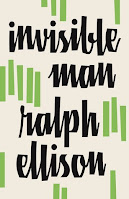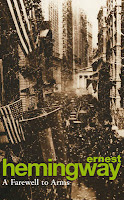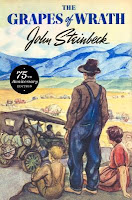This week (September 26-October 2) is Banned Books Week. This annual event was started in 1982 and celebrates the "freedom to read." We've put together a list of classics that have been banned and challenged all over the country for a variety of reasons, and all of these books can be found here at the DSLCC Library.
In addition, a list of 2020's most challenged books, as well as more information about Banned Books Week, can be found here.
Invisible Man by Ralph Ellison: First published in 1952 and immediately hailed as a masterpiece, Invisible Man is one of those rare novels that have changed the shape of American literature. For not only does Ralph Ellison's nightmare journey across the racial divide tell unparalleled truths about the nature of bigotry and its effects on the minds of both victims and perpetrators, it gives us an entirely new model of what a novel can be.
As he journeys from the Deep South to the streets and basements of Harlem, from a horrifying "battle royal" where black men are reduced to fighting animals, to a Communist rally where they are elevated to the status of trophies, Ralph Ellison's nameless protagonist ushers readers into a parallel universe that throws our own into harsh and even hilarious relief. Suspenseful and sardonic, narrated in a voice that takes in the symphonic range of the American language, black and white, Invisible Man is one of the most audacious and dazzling novels of our century.
As I Lay Dying by William Faulkner: As I Lay Dying is Faulkner’s harrowing account of the Bundren family’s odyssey across the Mississippi countryside to bury Addie, their wife and mother. Narrated in turn by each of the family members -- including Addie herself -- as well as others; the novel ranges in mood, from dark comedy to the deepest pathos. Considered one of the most influential novels in American fiction in structure, style, and drama, As I Lay Dying is a true 20th-century classic.
A Farewell to Arms by Ernest Hemingway: A Farewell to Arms is the unforgettable story of an American ambulance driver on the Italian front and his passion for a beautiful English nurse. Set against the looming horrors of the battlefield - the weary, demoralized men marching in the rain during the German attack on Caporetto; the profound struggle between loyalty and desertion—this gripping, semiautobiographical work captures the harsh realities of war and the pain of lovers caught in its inexorable sweep. Ernest Hemingway famously said that he rewrote his ending to A Farewell to Arms thirty-nine times to get the words right.
Their Eyes Were Watching God by Zora Neale Hurston: Fair and long-legged, independent and articulate, Janie Crawford sets out to be her own person -- no mean feat for a black woman in the '30s. Janie's quest for identity takes her through three marriages and into a journey back to her roots.
Brave New World by Aldous Huxley: Brave New World is a dystopian novel by English author Aldous Huxley, written in 1931 and published in 1932. Largely set in a futuristic World State, inhabited by genetically modified citizens and an intelligence-based social hierarchy, the novel anticipates huge scientific advancements in reproductive technology, sleep-learning, psychological manipulation and classical conditioning that are combined to make a dystopian society which is challenged by only a single individual: the story's protagonist.
Beloved by Toni Morrison: Winner of the Pulitzer Prize, Toni Morrison’s Beloved is a spellbinding and dazzlingly innovative portrait of a woman haunted by the past.
Sethe
was born a slave and escaped to Ohio, but eighteen years later she is
still not free. She has borne the unthinkable and not gone mad, yet she
is still held captive by memories of Sweet Home, the beautiful farm
where so many hideous things happened. Meanwhile Sethe’s house has long
been troubled by the angry, destructive ghost of her baby, who died
nameless and whose tombstone is engraved with a single word: Beloved.
Sethe
works at beating back the past, but it makes itself heard and felt
incessantly in her memory and in the lives of those around her. When a
mysterious teenage girl arrives, calling herself Beloved, Sethe’s
terrible secret explodes into the present.
Combining the
visionary power of legend with the unassailable truth of history,
Morrison’s unforgettable novel is one of the great and enduring works of
American literature.
Animal Farm by George Orwell: A farm is taken over by its overworked, mistreated animals. With flaming idealism and stirring slogans, they set out to create a paradise of progress, justice, and equality. Thus the stage is set for one of the most telling satiric fables ever penned –a razor-edged fairy tale for grown-ups that records the evolution from revolution against tyranny to a totalitarianism just as terrible.
When Animal Farm was first published, Stalinist Russia was seen as its target. Today it is devastatingly clear that wherever and whenever freedom is attacked, under whatever banner, the cutting clarity and savage comedy of George Orwell’s masterpiece have a meaning and message still ferociously fresh.
First published in 1939, Steinbeck’s Pulitzer Prize-winning epic of the Great Depression chronicles the Dust Bowl migration of the 1930s and tells the story of one Oklahoma farm family, the Joads—driven from their homestead and forced to travel west to the promised land of California. Out of their trials and their repeated collisions against the hard realities of an America divided into Haves and Have-Nots evolves a drama that is intensely human yet majestic in its scale and moral vision, elemental yet plainspoken, tragic but ultimately stirring in its human dignity. A portrait of the conflict between the powerful and the powerless, of one man’s fierce reaction to injustice, and of one woman’s stoical strength, the novel captures the horrors of the Great Depression and probes into the very nature of equality and justice in America. At once a naturalistic epic, captivity narrative, road novel, and transcendental gospel, Steinbeck’s powerful landmark novel is perhaps the most American of American Classics.
Slaughterhouse-Five by Kurt Vonnegut: Selected by the Modern Library as one of the 100 best novels of all time, Slaughterhouse-Five, an American classic, is one of the world's great antiwar books. Centering on the infamous firebombing of Dresden, Billy Pilgrim's odyssey through time reflects the mythic journey of our own fractured lives as we search for meaning in what we fear most.
The Color Purple by Alice Walker: Winner of the Pulitzer Prize and the National Book Award, The Color Purple is the moving story of a young woman’s endurance of shame and suffering to become whole and to know God. The novel became an instant classic and has been adapted into a film and musical. Paired here with The Temple of My Familiar, which the author describes as “a romance of the last 500,000 years,” this edition brings together two works that established Walker as a major voice in modern fiction.
Book photos and summaries from Goodreads.com.











No comments:
Post a Comment